Central laboratory
The client- oriented central lab of ICST possessing highly trained & experienced personnel and numerous facilities, offers a broad range of professional services including (characterization of specimens in compliance with up- to-date and customized standards, data analysis, technical consultation, etc.). It is also capable of providing services related to quality control and certification of submitted qualitative plans in accordance to relevant standards. The policies of the Central Laboratory include providing research and laboratory services to faculty members, researchers and graduate students of the Institute and other universities, and research centers. Standardization of tests and equipment, device calibration and also employing skilled experts in laboratories to ensure accurate results in the shortest possible time is another central laboratory's policy.
Facilities
- Raman Confocal Microscopy
- Fourier Transform Infrared Spectroscopy (FTIR)
- Thermo Gravimetric Analysis (TGA)
- Differential Scanning Calorimetry (DSC)
- Dynamic Mechanical Thermal Analyzer (DMTA)
- Thermal Mechanical Analyzer (TMA)
- Particle Size Analyzer (PSA)
- Dynamic Light Scattering (DLS)
- Scanning Electron Microscopy (SEM)
- Gel Permeation Chromatography (GPC)
- Atomic Force Microscopy (AFM)
- Rheometer (RMS)
- Xenotest
- Dilatometer
Raman Confocal Microscopy
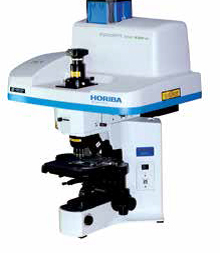
The XploRA PLUS couples a raman spectrometer to a standard optical microscope, allowing high magnification visualization of a sample and Raman analysis with a microscopic laser spot that is widely used for the characterization of materials in terms of their chemical composition. This instrument is equipped with two lasers 532 nm and 785 nm. XploRA PLUS enables the broadest range of sample analysis such as: Pharmaceuticals, Nano-materials Semiconductors, Polymers, Geology, Chemicals, Art and Museum Forensics.
- Fastest confocal imaging
- Depth Profile for transparent sample
- Non-destructive
- Simple sample preparation
- Water/aqueous phase sampling
- Organic/inorganic molecules
- Amorphous/crystalline
Fourier Transform Infrared Spectroscopy (FTIR)
FTIR Spectroscopy, is an analytical technique used to identify organic, polymeric, and, in some cases, inorganic materials. The FTIR analysis method uses infrared light to scan test samples and observe chemical properties. IR Spectroscopy measures the vibrations of atoms, and based on this, it is possible to determine the functional groups.
Company: Perkin Elmer
Instrument Model: Spectrum one
Wavenumber Range: 450-4000 cm-1
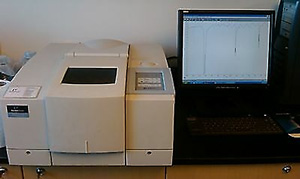
Thermal Gravimeter/Differential Thermal Analyzer (TG/DTA)
The PerkinElmer Diamond Thermo gravimetric/Differential Thermal Analysis (TG/DTA) system combines the flexibility of DTA with the proven capabilities of the TG measurement technology, providing property information for a variety of samples in the temperature range from ambient to 1500C. The simultaneous TG/DTA system can be used for such applications as oxidation, heat resistance, the amount of water, compositional analysis and the measurement of ash content in a sample.
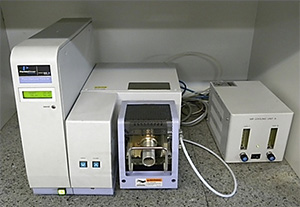
Differential scanning calorimetry (DSC)

Differential scanning calorimetry is a thermo analytical technique in which the difference in the amount of heat required to increase the temperature of a sample and reference is measured as a function of temperature. DSC analysis is used to measure melting temperature, heat of fusion, latent heat of melting, reaction energy and temperature, glass transition temperature, crystalline phase transition temperature and energy, precipitation energy and temperature, oxidation induction times, and specific heat. Instrument Model: Polyma 214 Temperature range: -150°Ϲ - 550°Ϲ
Dynamic mechanical analysis (DMA)
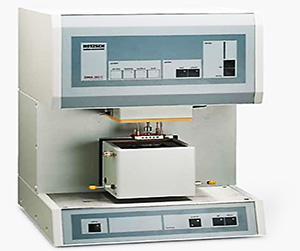
DMA is the most useful for studying the viscoelastic behavior of polymers. A sinusoidal stress is applied and the strain in the material is measured, allowing one to determine the complex modulus. This approach can be used to locate the glass transition temperature of the material, as well as to identify transitions corresponding to other molecular motions.
Company: Netzsch
Model: DMA 242C
Temprature Range -160 - 350 ºC
Frequency range 0.01 to 100 Hz
amplitude range 0.1 to 240 µm
Force 8N Static
8N Dynamic
Dilatometer
Dil-101/LT is a precision instrument for the measurement of dimensional changes in material as a function of temperature. Dilatometry can be used to test a wide range of materials including traditional and advanced ceramics, glasses, metals, and polymers. It provides measurements of a wide variety of properties including linear thermal expansion, coefficient of thermal expansion, sintering temperature, shrinkage steps, and phase transitions.
Company: Dama Pazhouh Arvin
Temperature Range RT - 1100 ºC
Resolution 30 nm
Sample length 50mm
Sample Diameter 1 -9 mm
Sample holder Alumina
Atmosphere Air
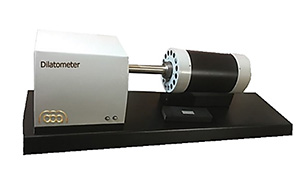
Dynamic Light Scattering (DLS)
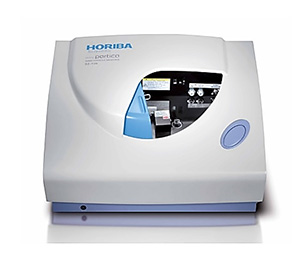
Horiba SZ-100 is an analytical tool for characterizing the physical properties of small particles through dynamic light scattering (DLS). Depending on the configuration and application the system can be used as a particle size analyzer, or also used to measure zeta potential, and molecular weight. Typical applications for this instrument include nanoparticles, colloids, emulsions, and submicron. suspensions.
Particle diameter 0.3 nm - 8.0 μm
Zeta potential Measurement range -200 – +200 mV
molecular weight measurement Range 1×103 - 2×107 g/mol
Gel permeation chromatography (GPC)
Gel permeation chromatography (GPC) is a type of size exclusion chromatography, which separates analyses on the basis of size. GPC has become the most widely used technique for analyzing polymer samples in order to determine their molecular weights and weight distributions.
Company: Yong Lin
Model: YL9100
Solvent: THF
Molecular weight range: 100 - 107 g/mol
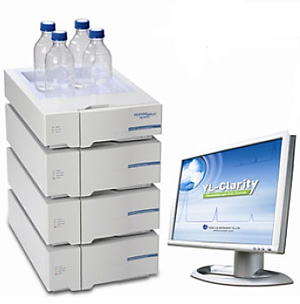
Particle Size Analyzer
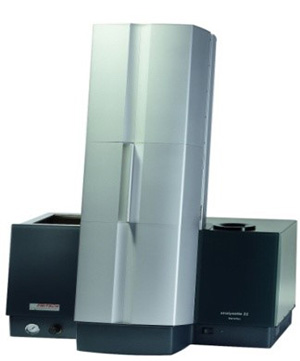
The device can be used to determine the particle size distribution in the form of suspensions, emulsions, solids, and aerosols. For particle characterization, both the size distribution as well as the shape parameters can be identified. The Analysette 22 is the only instrument in the world with which particle size distribution and the particle shape can be analyzed in a single measurement. A prominent feature of this machine is the accurate and repeatable measurements.
Company: FRITSCH
Model: Analysette 22
Measurement range: 0.01 - 2 µm
Particle Size Analyzer
The Malvern analytical Mastersizer 2000 laser diffraction testing instrument is used to evaluate Particle Size Distribution .Also it can be used for the measurement of emulsions, suspensions and dry powders in the range of 0.02 to 2000 micron. Particle size distributions for both wet and dry dispersions. This method has been used extensively in many industries including color and coating industries, Pharmaceutical, environmental, food, health, beauty and others.
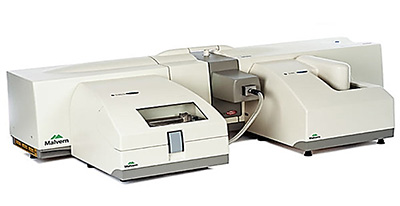
Scanning Electron Microscope (SEM)
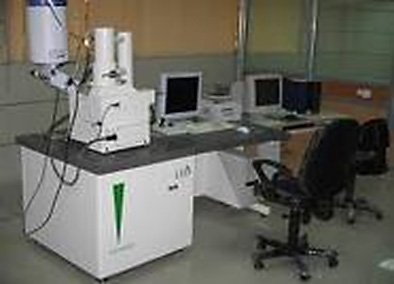
Scanning Electron Microscope (SEM) can easily produce surface images over a broad range of magnification (20X to 50,000X) from smooth surface, thin layer and fine powders.
Company: LEO
Model: LEO 1455 VP
Atomic-force microscopy (AFM)
Atomic-force microscopy (AFM) or scanning-force microscopy (SFM) is a very high-resolution type of scanning probe microscopy (SPM), with demonstrated resolution on the order of fractions of a nanometer. A scanning probe microscope is an instrument for positioning a sharp tip at a defined distance above the surface of sample. Using an atomic-force microscope (AFM), it is possible to measure roughness of a sample surface at a high resolution, to distinguish a sample based on its mechanical properties (for example, hardness and roughness) and, in addition, to perform a micro fabrication of a sample.
Scan range: 1 - 50 µm
Roughness: 2.7 µm
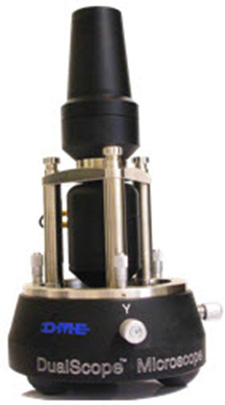
Rheometer
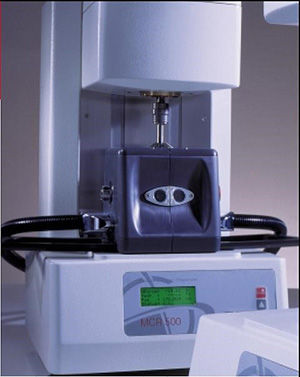
The rheological properties of a sample, such as viscosity or elasticity, can be determined with a rheometer. They can be used in quality assurance, for process designs, product development and research. MCR300 is equipped with different accessories to measure different type of materials. The (MRD) is a special accessory which enables all rheological test types to be carried out simultaneously to the application of the magnetic field.
XENOTEST
The XENOTEST BETA LM is an advanced light exposure and weathering equipment for obtaining vital information about the long term behavior of products when exposed to the influences of weather, and solar radiation in particular, using the time acceleration effect. The optimum conditions for an accelerated laboratory test are created by simulating the natural influencing factors and simultaneously intensifying important parameters at sample level.
XENOCHROM 300 (day light) 45-120 W⁄m2
XENOCHROM 320 (behind window glass) 35-100 W⁄m2
Test chamber temperature up to 80ºC
Black Standard temperature up to 130°C
Relative humidity 10 - 95 %
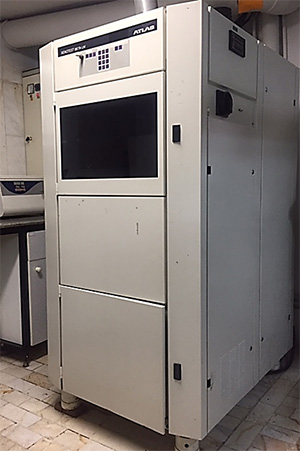
Thermal mechanical analyzer
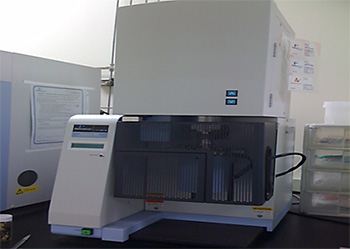
Thermal mechanical analysis is a method for studying material deformation as a function of temperature under non-oscillating force. Mechanical thermal analysis tests are usually performed under static forces and different probes are used to measure sample dimensions in compression, permeability, sintering, thermosetting, tensile and bending tests. Other measurements are obtainable using other device equipment which include stress relaxation, creep, film and fiber tension properties, flexural properties and dimensional stability.
Company: Perkin Elmer
Model: Pyris Diamond
Measurement range: ambient to 1500 ºC
Members
Head of Central Laboratory
Dr. Seyed Masoud Etezad
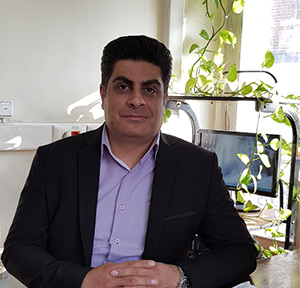
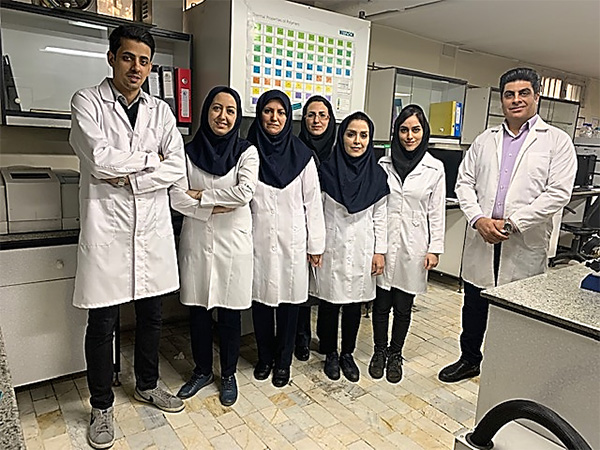
Laboratory Experts
- Somayeh Pozhhan
- Maryam Robatmeily
- Shirin Jebeli
- Sara Sadeghi
- Babak Nazari
- Ra’na Rafeai
